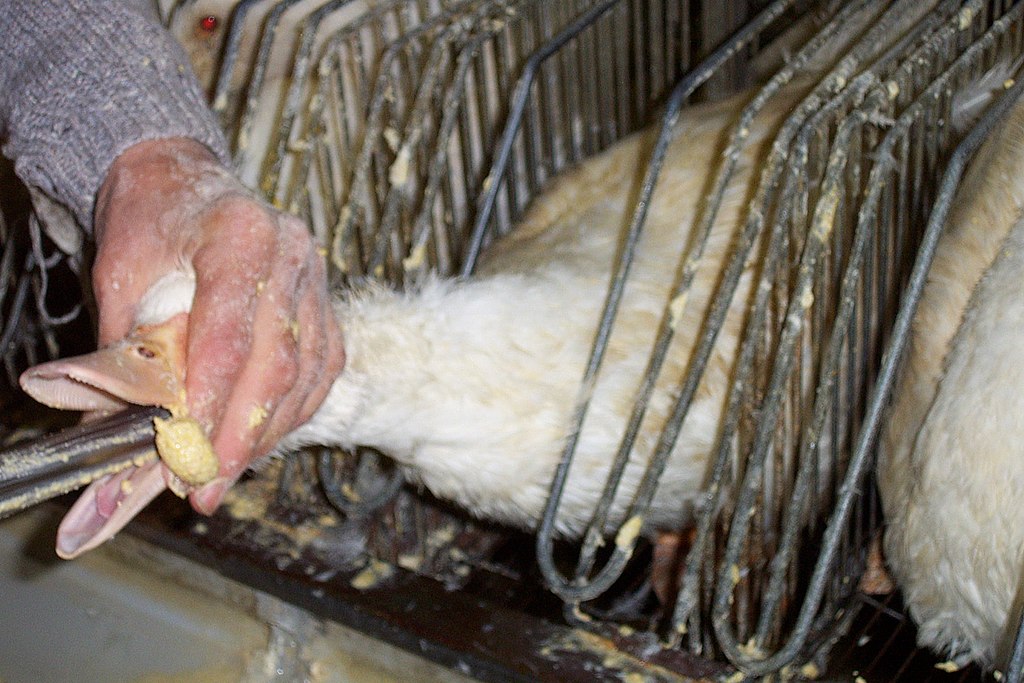I have been involved in the animal protection movement for almost 30 years, but to this day there are instances of institutionalised animal mistreatment that I find difficult to wrap my head around.
One of these is the production of foie gras with force feeding. For those who are unfamiliar with this method, and for clarity’s sake: foie gras is, literally, the liver of ducks or geese that are forced to ingest unnaturally large quantities of food to make their livers engorged with fat.
If “force-feeding” sounds a bit ominous, I can assure you that it is. From a certain age onwards, the ducks and geese are moved to barren cages and subjected to force-feeding 2-3 times a day for 2 to 3 weeks: a metal tube is inserted into their throat and large quantities of food (much more than they would ever voluntarily ingest) are pumped into their bodies.
This procedure is repeated until the animals’ livers grow to more than ten times their normal size. Then it’s time for slaughter and harvesting the fatty livers, which are then made into the final preparation that is called foie gras.
Over the years, the industry has maintained that force-feeding (which they prefer to call “assisted feeding” to make it sound less repugnant) is carried out “expertly and gently” by skilled operators and that, due to the anatomy of the oesophagus of ducks and geese, the procedure is “not stressful for the animals”. Inducing fatty livers would also be compatible with animal welfare because ducks and geese would be naturally programmed to overeat.
Thanks to numerous investigations we know that this idealised version of the facts is very far from representing reality. Birds react very negatively to force-feeding and suffer higher mortality rates compared with other duck production systems.
Scientists agree that this practice is detrimental to animal welfare because it causes severe health issues, including thermal stress, bone problems and obesity, which in turn lead to severe foot and leg disorders, and to other pathological conditions.
In Europe we are very proud of our agri-food productions, so much so that as many as 3,500 products are protected by geographical indications. Do not get me wrong, I believe in the importance of guaranteeing food quality and protecting consumers from fraud. I am not disputing here the right to produce and consume foie gras, although one could still make the point that eating it is unnecessary, unhealthy and in bad taste (but that is a matter of personal convictions).
What is beyond my comprehension is how we can defend force-feeding in light of European animal welfare legislation. True, some practices have long-standing origins. There’s pride involved, of course. I can still remember a French relative explaining he couldn’t refuse to eat foie gras at the Christmas dinner. His parents would disinherit him. However, traditions can never be used as a justification to systematically harm animals.
Luckily, things are changing. The general public is now firmly against forced feeding. Many polls have made this abundantly clear and even French citizens have turned their back on this barbaric practice. As a result, 22 EU countries banned force-feeding on their territories, thus paying full regard to the important article of the General Farming Directive stating that “No animal shall be provided with food or liquid in a manner, nor shall such food or liquid contain any substance, which may cause unnecessary suffering or injury.”
The only places where force-feeding is still allowed are France, Hungary, Bulgaria, Spain, and the Walloon region in Belgium. For now, foie gras produced with force-feeding can still be imported and sold to the public anywhere in the European Union. However, things might become less black and white in the future, as shown by the outcome of a recent court case in which a German retailer was fined 500 EUR for selling foie gras obtained with force-feeding. The court ruled that the shop had been complicit in something that is now considered a crime in Germany (i.e., force-feeding) and fined it accordingly.
There are only two solutions to this disgraceful situation: getting rid of force-feeding or opening the way to alternative methods to produce foie gras. It will come as no surprise that I would wish to see a full ban on force-feeding. However, while we get there, there is a technical and (one would think) less controversial option.
The EU poultry marketing standards set down arbitrary minimum weights for the livers of ducks and geese that are to be sold as foie gras. These minimum liver weights (300g for ducks, 400g for geese) can only be reached if the animals are force-fed. They were suddenly established in 1991 without any independent scientific studies or assessment of their potential impact on animal welfare (nor consumer choice or fair competition for farmers who use alternative methods).
So the current EU legislation is de facto obliging producers to force-feed their animals if they want to market their product as foie gras. If the European Commission deleted the minimum requirement on liver weight, producers could decide for themselves whether to ditch force-feeding and adopt more animal welfare friendly methods to induce fatty livers in their animals.
This is already done in some niche sectors of the market, but a major obstacle is that the product cannot be lawfully marketed as foie gras. This situation not only puts animal welfare conscious producers at a disadvantage but it also prevents consumers from driving change by purchasing foie gras produced without force feeding.
Now that a concrete opportunity is on the table, thanks to the ongoing revision of the poultry marketing standards, the foie gras industry is up in arms against this proposed change, and there is a concrete risk that they will have the upper hand.
They fear loss of their own market share and they’re fiercely defending an outdated and cruel way of producing foie gras against all possible fair competition. They are trying to generate confusion by claiming that the minimum liver weight (which was arbitrarily determined) is what defines foie gras, which is evidently not true. This is clearly unacceptable.
In light of scientific evidence, citizens’ opinions, and the reputation of the EU as global animal welfare leader, it is time for the European Commission to open the foie gras market to producers who no longer wish to blindly stick to the cruelty of force-feeding and want better lives for their animals.


